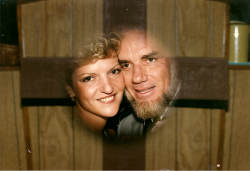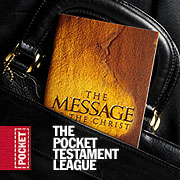There were many lamps in the upstairs room where we were meeting. Seated in a window was a young man named Eutychus, who was sinking into a deep sleep as Paul talked on and on. When he was sound asleep, he fell to the ground from the third story and was picked up dead.
Thoughts for Today:The upper room (third floor) where Paul was speaking was probably hot because of the large number of people in attendance, plus the many lamps. The combination of the heat and length of Paul's talk lulled Eutychus, the young man (probably around 14 years of age), to sleep who then fell out the window to his death. What a tragic event!
As Eutychus' parent I might say, "I shouldn't have let him sit in the window in the first place." Or maybe as a critical observer, "If he had been paying attention he wouldn't have fallen asleep." Or even as a compassionate family member, "If someone had designed the room better there might have been better ventilation, and the tragedy could have been avoided all together." Did you see what just happened? From three perspectives the responsibility for the death went from the self-guilt of the parent; to the personal responsibility (or rather irresponsibility) of the individual; and ultimately to a vague "someone." As silly as it would have seemed in Paul's day, in our legal system that "someone" (designer/builder/owner) would probably have legal and financial responsibility for not providing a safe environment and thereby was the cause of Eutychus' death.
From my perspective it was simply a tragic accident. Too often we make ourselves crazy -- either riddled with guilt or angry and out for retribution -- when indeed there was and is no fault in an accident. An accident by definition is: the way things happen without any planning, apparent cause, or deliberate intent. The problem is we have difficulty understanding and accepting that a life can be lost without meaning -- at least none within our ability to grasp or understand. After all, what purpose could be met in the death of Eutychus?
The Bible tells us in James 2:21-22, "Was not our ancestor Abraham considered righteous for what he did when he offered his son Isaac on the altar? You see that his faith and his actions were working together, and his faith was made complete by what he did." Abraham did not understand the meaning or purpose of the sacrifice of his son Isaac, just that God had asked for it. As I read our passage today, I wondered if Eutychus had been my son and had died a tragic yet accidental death; would I place his death on the altar of God and thereby complete my faith; or would I be angry at God for letting it happen? Would I in grief look for a villain to blame or would my faith and action work together? Those are really big and difficult questions to answer. How would you respond?
Questions to Ponder:Those of us who are familiar with the Book of Acts know the story of Eutychus has a "happy ending." However, in this life that is not always our experience. Accidents happen and people, including loved ones, lose their lives. The Bible tells us in Roman 8:28, "And we know that in all things God works for the good of those who love him, who have been called according to his purpose." It is during tragedies that we are really challenged to apply that lesson of trusting God "in all things." How do you respond when an accidental tragedy occurs? How do faith and action work together in your life? How do we find God's purpose in those things we do not understand?
I pray that for all of us who face tragedy in this life, we would allow our faith and action to work together -- placing our loss as a sacrifice upon the altar of God, and as a result our faith would be made stronger, completed because of our trust in God. Amen.





 RSS Feed
RSS Feed
